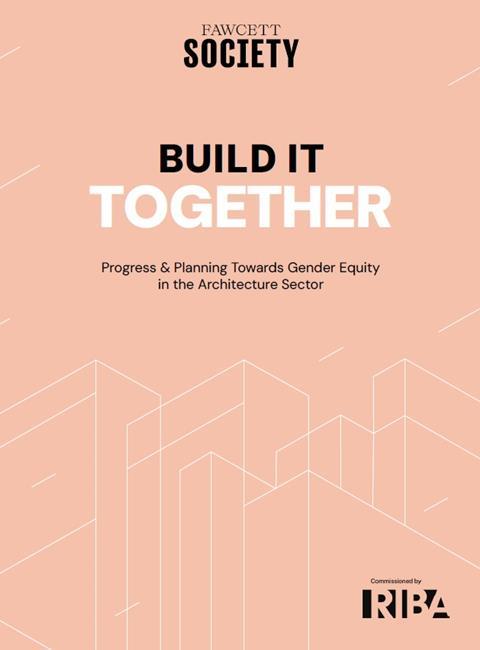A new report commissioned by the RIBA suggests that progress towards gender equity in architecture remains slow.
Titled Build it Together: Progress and Planning Towards Gender Equity in the Architecture Sector, and produced independently by the Fawcett Society, the study combines national data with responses from more than 600 women working in architecture. It follows RIBA’s 2003 report Why do women leave architecture?, which also drew attention to the barriers faced by women within the profession.
The findings indicate that pay disparities, exclusionary workplace cultures and the career penalties faced by mothers and carers continue to shape women’s experience in practice, with 83% of respondents saying that having children had hindered their career progression.
Half reported experiencing harassment or misogyny at work, while only 11% of those who reported incidents received what they considered a satisfactory response from their employer. Many participants cited a lack of formal HR structures, limited support for maternity and menopause, and inconsistent procedures for addressing discrimination as barriers to change.
The report also notes examples where firms have taken positive steps to introduce flexible working or transparent promotion processes, and where grassroots networks such as Women in Architecture have sought to provide mentoring and peer support.
In total, the report makes 47 recommendations directed at RIBA, government and architectural practices, including 20 specifically for RIBA. The institute has accepted the findings and outlined a one-year plan to deliver on ten recommendations within the next 12 months.
These actions include the publication of new HR guidance and templates, the development of continuing professional development (CPD) materials through the RIBA Academy on returning to work after career breaks, and additional support for equality, diversity and inclusion (EDI) leads across RIBA regions. The plan also proposes voluntary EDI monitoring and an annual diversity audit of speakers, contributors and exhibitors.
Dr Valerie Vaughan-Dick, RIBA chief executive, said: “This report lays bare the scale of architecture’s gender inequity crisis. We cannot afford to lose talented women to outdated workplace cultures or structural inequity. We therefore accept the report’s findings and note the recommendations – committing ourselves to meaningful action.”
Fawcett Society chief executive Penny East said the research revealed continuing disparities but also a determination across the sector to address them. “We see from this project and from our research that there are too many women in the architecture profession who are being paid less or treated differently to their male colleagues,” she said. “However, it is also clear that there is a real determination from women, from sector leaders, professional networks and from RIBA to pursue gender equality in architecture.”
>> Also read: The power of mentoring for women in architecture
>> Also read: Reimagining architecture: a movement for structural change
>> Also read: More women are becoming architects – but will they stay?
Full list of recommendations in the report:
Working as an architect
Architecture practices and employers should:
-
Ensure they have a comprehensive suite of employee policies, including those relating to equality and diversity, which are available to employees and prospective employees, and which are regularly reviewed in collaboration with staff.
-
Monitor the diversity of their staff and boards, set appropriate internal targets for representation and report on these annually.
-
Conduct regular staff satisfaction surveys which ask questions about wellbeing and workplace culture, and act on the findings of these.
-
Publish parental and maternity leave policies that follow best practice; do not wait until the policy is needed before creating it.
-
Have a specific strategy and process to support people going on, and returning to work from, maternity leave including following the UrbanistasNW “Careers, Kids and Caring Responsibilities Toolkit” and make this available to staff.
-
Provide explicit rationale for policies requiring employees to have a presence in the office and allow working from home where possible.
-
Offer flexible working options and discussions to all employees as standard.
-
Implement structures to record out-of-hours work, including work undertaken at home, and audit this every six months.
-
Undertake risk assessments under the prevention duty to ensure they are taking steps to prevent sexual harassment.
-
Provide information to all employees about what constitutes appropriate behaviour and how to report anything which does not meet this standard.
-
Allow staff time to engage with networks and undertake networking within working hours including engaging with mentoring and reverse mentoring schemes.
-
Ensure at least one senior staff member has EDI within their role description, protected time to carry out their duties relating to this, and sufficient training to ensure appropriate expertise.
-
Organise social and team building events which are accessible and attractive to everyone; ensure that managers understand contexts and situations that would make employees feel uncomfortable. (To note that RIBA has produced a Toolkit on how to create Inclusive Events).
RIBA should:
-
Support architects at all levels by providing a basic level of HR support, including expanding upon existing best practice template policies, which must:
— Be easily adoptable ‘off the shelf’ but also able to be adapted.
— Be available to non-chartered practices as well (with an additional level of support available to RIBA’s members, if desired).
— Be developed with an explicit anti-sexist, anti-racist and anti-ableist lens.
— Include:
— Maternity/Paternity/Miscarriage/Adoption leave
— Other forms of carers leave
— Flexible/part-time work requests
— Menopause policy
— Domestic abuse policy
— Reasonable adjustments guidance
-
Broaden the current HR and legal support helpline offer, including individuals employed on a freelance basis to provide support and guidance on specific issues including overcoming barriers relating to being from a minoritised group.
-
Implement monitoring of Chartered Practices in terms of HR policies and the gender and ethnicity pay gap and produce publicly accessible information about them.
-
Refuse to charter any practices which do not meet a base level of standards, including HR policies on maternity/carers leave, harassment and bullying, and reasonable adjustments.
-
Provide training and support to the EDI volunteer leads in each region.
-
Develop RIBA Academy CPD offering around returning to work following extended career breaks (from minimum 6 months) and implement monitoring and evaluation of this project.
-
Further develop the RIBA Inclusion Charter to include greater monitoring and accountability to ensure practices are meeting requirements beyond the initial sign-up period. This monitoring should be done via an intersectional lens.
-
Ensure grassroots organisations and networks are consulted at the outset of developing new resources/toolkits/events; take a ‘create not rate’ approach to projects which means including diverse networks in a meaningful way from the outset.
-
Improve its promotion of ‘best practice’ guides such:
— How to be an ally/active bystander (around gender, race, and disability)
— Inclusive networking events
— How to run inclusive meetings
The UK and/or devolved governments should:
-
Reform and expand the parental leave system so that both parents are individually supported and remunerated.
-
Ensure upcoming changes via the Employment Rights Bill are effectively implemented and with the resources to enforce where necessary.
-
Require employers to advertise the reasonable flexible work options available to applicants during recruitment, such as flexible hours, compressed hours, job sharing, remote working, or part-time work. Roles should be advertised as flexible by default, unless there is a legitimate business reason not to.
-
Invest in affordable childcare provision that provides the hours and flexibility many working parents need.
Pay and progression
Architecture practices and employers should:
-
Have full salary transparency and remove clauses from contracts which prohibit employees from discussing their salaries.
-
Adopt best practice policies for unbiased recruitment including blind applications, diverse interview panels, removing biased language from job adverts, and ensuring that any recruitment tools (including AI) have necessary safeguards to remove gender bias.
-
Not ask salary history questions at any point during the application or negotiation process, as this perpetuates pay disparities by gender, ethnicity, and other characteristics.
-
Monitor their gender, ethnicity and disability pay gaps (even if not mandated to by legislation) and produce action plans to close them.
-
Ensure anyone managing staff receive training in management and have access to mentoring and reverse mentoring schemes, especially at the point of recruitment or promotion.
RIBA should:
-
Remove the annual membership fee for people on maternity or parental leave of more than 6 months; consider increasing the £25,000 ceiling for low-income options.
-
Produce best practice guidance for salary transparency, blind applications, appraisal processes and promotion.
-
Refuse to list any jobs on RIBA Jobs which do not have a salary advertised or which ask for details of previous salary from applicants.
-
Produce mandatory CPD modules on RIBA Academy relating to different levels of management responsibility.
-
Support networks offering ‘mentoring up’ and ‘reverse mentoring’, as well as peer mentoring.
The UK and/or devolved governments should:
-
Broaden the requirements for gender pay gap reporting and expand it to include the ethnicity and disability pay gaps; increase the robustness around enforcement of reporting and action plans.
-
Require employers to publish action plans to tackle pay gaps including around how employers provide support during maternity, menopause, and action to ensure pay transparency.
-
Legislate to provide employees with the Right to Know what a colleague is earning if they suspect pay discrimination.
-
Respond to the national campaign to end salary history questions at application and require the publication of salary ranges on job descriptions.
Legislation and regulation
Employers and practices should:
-
Explore opportunities to use large projects to diversify the workforce including setting up special training projects on site, ensuring that working hours are flexible from the beginning, and proactively apply equal opportunities and diversity policies through structured implementation plans.
RIBA should:
-
Support independent mentoring and support schemes for students from underrepresented groups during both study and work placements, such as the Future Architects Academy, and explore integrating this within the RIBA Future Architects initiative.
-
Analyse all of its work with an intersectional feminist lens and increase organisational competency to allow them to do this, including by recruiting staff and consultants with specific expertise.
-
Continue its commitment to regular mandatory training and refresher training on EDI, appropriate behaviours, and bullying and harassment.
-
Commit to voluntary EDI monitoring and an annual audit of the diversity of their speakers, contributors, exhibitors, and panellists.
-
Continue its efforts to stream and update the equality content on their website, archiving outdated guidance and making it simple for people to find relevant information and support.
-
Commit to reconvening attendees from this research periodically to test progress against these recommendations, and consider establishing a resourced advisory panel or steering group to provide accountability and support for their EDI work.
The full report can be downloaded here.

















2 Readers' comments